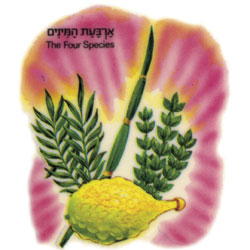|
The torah commands us in Parshas Emor (Leviticus 23:40) “Vilakachtem
Lachem Bayom Horishon …”—
“and you shall take for yourself on the first day”
;
1) “Pri Eitz Haddar”—
a fruit of a beautiful tree
THE ESROG (citron)
2)“Kapos Temarim”
— date palm branches
THE LULAV (palm)
3)“Vianaf Eitz Avos”
— twigs of a plaited tree
THE HADDAS (myrtle)
4)“Viarvei Nachal”
— willows of the river
THE ARAVAH (willow)

To fulfill the commandment (the Mitzvah) we need
all four species and not one can be missing. The Rabbis have
interpreted the Mitzvah as follows:
One (1) Esrog
One (1) Lulav
Three (3) Haddassim (this is the minimum but many people
add more to beautify the Mitzvah)
Two (2) Aravos
What to look for when selecting the
Arbah Minim.
There is the Mitzvah and then there is Hiddur Mitzvah
which in essence translates to not just purchasing any Kosher
Esrog set, but trying to purchase the most beautiful
one.
What is beauty?
Beauty in an Esrog could mean many things;
cleanliness, bumps and ridges, no stains, no scratches, no
holes etc.
The shape also plays a major roll in the Esrog, some look
for a shape of a “migdal” or tower, wider
on the bottom and narrower on top – almost to a point.
Others prefer the shape of a heart, wider on top and smaller
on bottom (because in the Midrash the Esrog is compared to
the heart of a person).
Many Esrogim grow with a pitum (a wood like growth
on the top of the esrog.) Most of the Yanover (from Calabria,
Italy) grow without it, as it dries up during the first few
weeks of growth. The esrog remains 100% kosher if it falls
off while still growing on the tree. Some Yanover Esrogim
do have a pitum, but they are more costly because of the rarity.
(Please specify during ordering as to all your preferences)
Most of the Esrogim from Israel do have a pitum and
the cost is the same for ones with or without.
Beauty in a Lulav, means that it should
be green, fresh, straight and not bent. The middle leaf should
be 100% closed (but don't worry – even if it opens up
1/3 of the way down, its still Kosher.)
Beauty in the Haddas (a myrtle branch)
means that it has three leaves growing out of the stem on
the same level and those leaves cover the entire wood of the
stem. The minimum requirement is just three branches but some
add extra branches. (All of our Hadassim come pre checked
for Kashruth and are vacuum packed to ensure freshness.)
Beauty in the Aravah (willows growing near
a river or body of water) means branches with a red stem,
and leaves with smooth edges. (Our Aravos are vacuum packed
to insure freshness and Kashruth.)
|